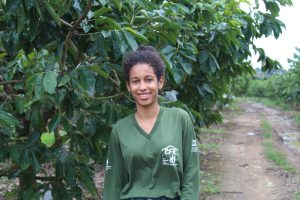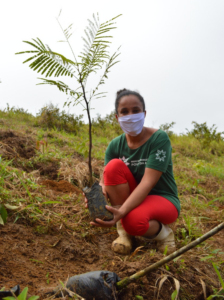Contributing to expanding access to the Our Culture collection, the Norberto Odebrecht Foundation (FNO) has just launched the digital...
For more women in Family Farming
DATE: 03/08/2022
Boosting female participation in the field is a challenge, but advances are already happening
Home to almost 16 out of every 100 Brazilians, the rural zone coexists with a series of issues that hinder full gender equality – a topic that is the focus of our discussion on this International Women’s Day. Especially due to cultural factors, rural women face more difficulties than men do in accessing water sources, land ownership and regularization, rural credit, technical assistance, or inputs purchasing. This restriction of access jeopardizes the full economic, social, and environmental development not only for them and their communities – but for society as a whole.
“Besides giving opportunities to girls and women, it is necessary to promote a change in thinking,” explains Cristiane Nascimento, responsible for Sustainability, Partnerships and Communication at Norberto Odebrecht Foundation. The Foundation has been active in rural areas since 1999, when it began to focus on the Northeast region, and today it coordinates a Social Program that strengthens family agriculture in vulnerable regions.
“Many women, for example, work as equals with their partners or children on the farm, but they don’t call themselves family farmers. This is the result of an idea that this area does not belong to them. Our role is to encourage these people to be recognized for their protagonism,” says Cristiane.

Júlia was a student at one of the partner organizations of PDCIS, the Foundation’s Social Program, and is inspired by the example of other women
With the joint efforts of groups, associations, collectives, and cooperatives, mainly under the leadership of girls and women, this scenario is already being changed. Some data show that female participation in the countryside is growing not only in ‘sight’ of rural communities, but also in official numbers. A survey by the National Supply Company (Conab), for example, revealed that the presence of women in the Food Acquisition Program (PAA), a public policy that encourages the sale of family farming products, reached 80% in 2019. This is the highest rate ever recorded in the country.
And those women’s contribution continues to be important, even when it is not exclusively from agriculture: rural women are responsible for about 43% of their families’ income, according to the Brazilian Institute of Geography and Statistics (IBGE), a higher percentage than in urban areas.
Female Empowerment in practice
In the Social Program coordinated by the Foundation, the participation of women is one of the bases for the work done. Besides being encouraged to actively participate in the day-to-day productive activities on their farms – and to recognize themselves as farmers – the women beneficiaries of PDCIS also have the opportunity to lead discussions within the socio-productive organizations in their regions on how to promote gender equality.
The institutions that run the Program also encourage equality within their structures – in 2021, the Boards of these organizations had 58% of female members; and 51% of leadership positions were held by women.
Did you know? PDCIS’ women empowerment practices generate changes not only locally, but also contribute to the achievement of Sustainable Development Goals (SDGs) such as 5, Gender Equality, and 10, Reducing Inequalities.
An example of a PDCIS beneficiary who materializes this empowerment is Teresa Vieira, an agro-ecological farmer supported by the Land Conservation Organization (OCT), one of the institutions that runs the Foundation’s Social Program. She fully recognizes herself as a farmer – not only as a profession, but as part of her identity. “My family is of peasant origin. The relationship with the land, with food, is my foundation,” she says. This vision is also perceived in the performance of the 57 women farmers associated with COOPATAN, a Program partner cooperative.
Júlia Teles, who was a student at Presidente Tancredo Neves Rural Family House (CFR-PTN), says she is inspired by the example of other women from the rural zone. “When a girl sees a woman in a leadership position, she thinks, ‘I can do it. She sees herself in that woman. It is very important to have these examples and to know that if I like the land and planting, I can be in the rural environment and live like this. We need to stop this idea that agriculture is only for men,” she says. In 2021, the rural schools running PDCIS, had 48% of female students.




No comments